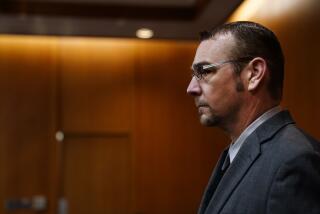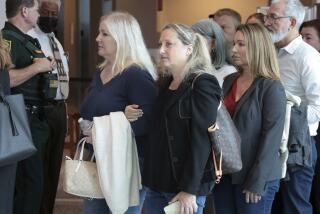Prosecution argues its murder case against George Zimmerman
SANFORD, Fla. -- George Zimmerman assumed that Trayvon Martin was up to no good on a rainy night in this Florida town so the neighborhood watch volunteer decided to act, which led to a confrontation that resulted in the death of the unarmed teenager, according to the prosecution in the murder case that excited passions about race and guns across the nation.
Prosecutor Bernie de la Rionda on Thursday gave the closing statements to the six-woman jury that will decide the fate Zimmerman, 29. He is charged with second-degree murder but earlier Judge Debra S. Nelson ruled that the jurors will also be allowed to consider a lesser charge of manslaughter.
“A teenager is dead. He is dead through no fault of his own,” De la Rionda told the jurors in a closing that is expected to take up most of the afternoon in the Sanford courtroom.
GRAPHIC: Who’s who in the Trayvon Martin case
“He is dead because another man made assumptions,” the prosecutor continued. “That man assumed certain things. He’s dead not just because the man made those assumptions. Because he acted on those assumptions. And unfortunately, unfortunately, because his assumptions were wrong, Trayvon Benjamin Martin no longer walks on this Earth.”
“What was his crime?” De la Rionda said as he held up two plastic bags containing the items taken from Martin’s body. “He bought Skittles and some kind of ice tea or whatever it’s called. That was his crime.”
Martin, 17, was returning from a convenience store with the candy and soft drink on the rainy night of Feb. 26, 2012. Zimmerman, described by the prosecution as a key member of the neighborhood watch who wanted to become a cop, spotted Martin and called police to report a suspicious person in the Retreat at Twin Lakes, a gated community in Sanford, where Zimmerman lived at the time.
PHOTOS: The controversial case in pictures
Martin was committing no crime, but Zimmerman “assumed Trayvon Martin was a criminal. That is why we are here,” De la Rionda said as members of the two families watched, impassive from the audience. Wearing gray, George Zimmerman just stared.
The prosecutor then played one of the tapes in evidence, this one included the profane comments Zimmerman made to authorities about “punks” getting away with their crimes. De la Rionda said the comments showed “ill will, hatred or spite,” the categories needed for a conviction on second-degree murder.
“The law doesn’t allow people to take the law into their own hands,” De la Rionda said, repeating the prosecution’s central argument that Zimmerman profiled the teenager, followed him and then shot him.
De la Rionda dismissed Zimmerman’s self-defense argument, accusing Zimmerman of lying in recorded statements to authorities about what happened that night. De la Rionda hammered home his point about Martin being a victim by showing jurors a photograph taken from the teenager’s autopsy.
Zimmerman has apologized for shooting Martin but has argued that he acted in self-defense when the teenager attacked him.
The defense will get its chance to summarize its case Friday and the prosecution will get a rebuttal. The judge will then instruct the jury before it begins deliberations.
Earlier, Nelson granted a prosecution request to allow jurors to also consider the lesser charge of manslaughter, but rejected a prosecution effort to add a third charge of felony murder based on the argument that Martin was younger than 18 so that Zimmerman’s shooting was child abuse.
The added charge was a standard prosecution effort to give jurors more options to convict. The defense sought to keep the jury’s choice to either the harder-to-prove top charge of second-degree murder or outright acquittal.
ALSO:
DNA ‘familial match’ ties DeSalvo to 1964 Boston Strangler case
Judge’s unique sentence: Woman told to write about being a lady
‘Great Gypsy’ or ‘Great Gatsby’? N.Y. school reading list gets an F
More to Read
Sign up for Essential California
The most important California stories and recommendations in your inbox every morning.
You may occasionally receive promotional content from the Los Angeles Times.












